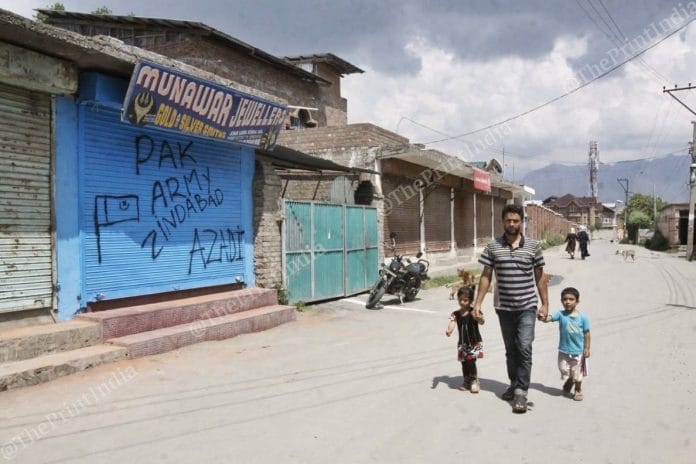Srinagar: With no official word on the restoration of mobile phone and internet services in Kashmir, the state administration has now divided cellphone numbers in the Valley into a ‘black list’ and a ‘white list’.
The ‘black list’ contains numbers that aren’t currently working while the ‘white list’ is of those cellphones that have been made functional since 4 August, when the administration “blocked” all mobile phones in the state ahead of the Narendra Modi government’s decision to scrap Article 370.
A total of 88 lakh mobile phones in the Kashmir division alone were blocked on the intervening night of 4 August and 5 August, the day the government revoked the Constitutional provision for the state.
According to senior government officials, somewhere between 5,000 and 6,000 mobile numbers have been since ‘white-listed’, or unblocked. Most of these numbers belong to officials of the state administration, and officers of the Jammu and Kashmir Police, Army and paramilitary forces.
While the mobile phone network has been restored in Ladakh and Jammu divisions of the state, the communication blockade remains in the Valley with the administration citing the sensitive law and order situation there as reason.
However, incoming call facilities to some post-paid mobile phones (Airtel and BSNL) have been started in parts of Kupwara and Handwara regions of J&K, keeping in view the heightened activity of foreign militants in north Kashmir.
ThePrint had earlier reported that more than 60 foreign militants have managed to infiltrate into Kashmir from the northern parts of the Valley in the last two months.
Intelligence reports of infiltration and ground-level activity of militants coupled have put the state administration in a fix over restoring mobile services in the Valley.
While human intelligence regarding movement of militants has taken a major hit in the last two months, senior police officials say opening of mobile phones could also pose a threat to law and order situation of the state, particularly the Kashmir valley.
Also read: How doctors in Kashmir are dealing with lockdown — with anti-anxiety pills & generosity
How was the ban enforced
According to senior government officials, all of the 88 lakh mobile phone numbers were blocked between 4 August and 5 August. This included numbers of all central government and state administration officials.
“Senior officials, however, were given satellite phones through which they communicated with each other. The first few numbers were unblocked only after 7 August,” said a senior government official. “Now there around 5,000-6,000 numbers working. An application requesting restoration of mobile phone services has to be cleared by the state administration and the police. This is also mostly limited to government officials.”
The official, however, added that incoming and outgoing call facilities of mobile phones belonging to some civilians too were restored after their application was properly vetted. “It was done only after a thorough background check.”
The official added that the process of unblocking the numbers is called white-listing.
“We are not sure when mobile services will be fully restored. Till then numbers in exceptional cases might be restored but this too is a limited measure,” said another senior state government official. “We have to take care of the law and order of the state.”
Landlines restored
While uncertainty remains over restoration of mobiles, landlines in the state are completely functional.
In Kashmir, the landline service was restored in a phase-wise manner. In fact, broadband internet service, which operates through landline numbers, too has been restored in Jammu and Ladakh. Kashmir, however, remains an exception.
“There are currently 43,000 landline connections most of which are operational. Services in only those areas which fall in the category of being extremely sensitive, or connections to individuals who could pose a threat to law and order, remains suspended,” said a senior state administration official.
Also read: J&K govt to set up insulated panel huts for paramilitary to prepare for Kashmiri winter
Restrictions back as Doval in town
Restrictions were reimposed in parts of Srinagar ahead of 27 September, Prime Minister Narendra Modi and his Pakistani counterpart Imran Khan are scheduled to deliver a speech at the United Nations General Assembly.
Amid speculation that there could be a law and order situation in Jammu and Kashmir as a fallout of the speeches, the state police and the paramilitary forces posted in Kashmir have taken stringent measures such as frisking and checking of vehicles.
According to senior security officials, National Security Advisor Ajit Doval too is currently in J&K to take stock of the situation.
Another senior security official said restrictions in other parts of Kashmir are likely to be reimposed if the state administration and the Union government perceive threat levels to be high. On account of September 27 being a Friday, the officials said, the situation in Kashmir is “sensitive”.
Also read: Bakarwal nomads return to the plains as business dries up due to Kashmir shutdown







Almost two months now. I don’t think such a long shutdown was originally planned for. The economic costs are mounting. Diligent diplomacy has prevented awkwardness from foreign governments. However, the media perceptions are uniformly unflattering. The resolution passed by the Labour Party could not have been worse; it could soon be in office in Britain. President Trump has called for the better future promised to Kashmiris to be delivered to them.